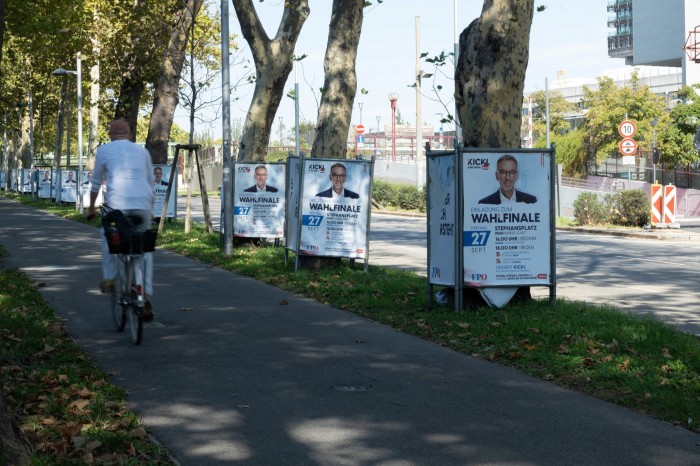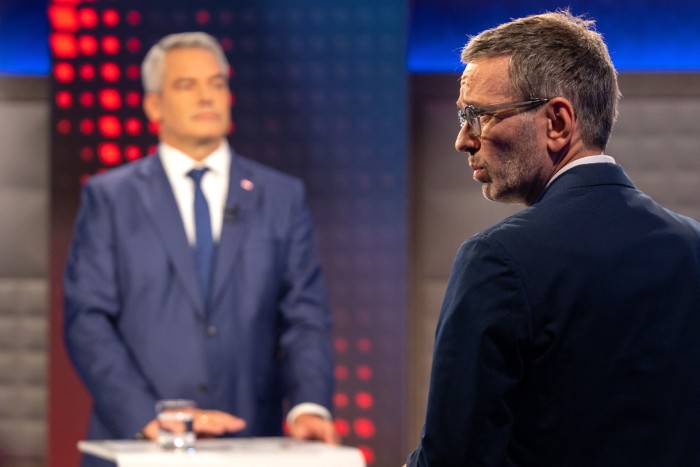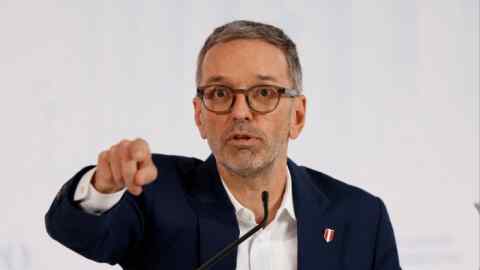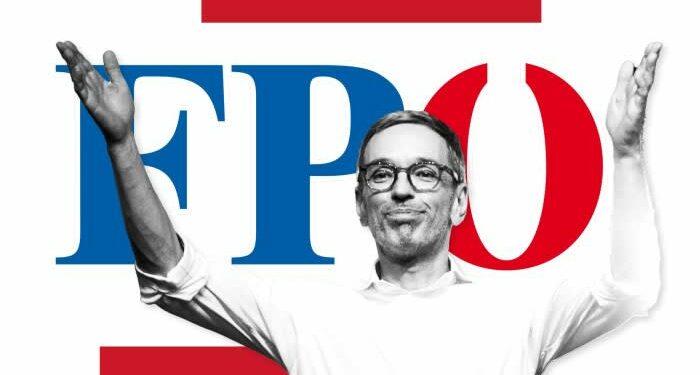Some content could not load. Check your internet connection or browser settings.
The FPÖ has achieved this comeback under Kickl by pursuing a political platform that has tacked hard to the right, as its provocative sloganeering attests.
Austria’s even more extreme identitarian movement, which the FPÖ’s previous leadership deemed too toxic because of its views on racial and cultural purity, was just a “rightwing NGO” in the orbit of the party in the same way that Greenpeace was for the Greens, Kickl said last year.
His party has since embraced identitarian concepts such as remigration — sending people with a migrant background, even if they are Austrian citizens, back to their origin country.
“The thinking used to be that to be part of government, you had to make yourselves palatable to the political centre. Kickl hasn’t followed that logic one bit,” said Bernhard Weidinger, a specialist on rightwing movements at the Documentation Centre of Austrian Resistance, a historical research institute.
“He has taken an increasingly hardline ideological course and the interesting thing is, it seems to be working.”
Weidinger said that when Kickl took over the leadership of the party in 2021, people doubted he would appeal to voters beyond his hardcore base. The polls have been telling a different story.
 Freedom party election posters in Vienna © Elisabeth Mandl/REUTERS
Freedom party election posters in Vienna © Elisabeth Mandl/REUTERS
In 2023, Austria had the fifth-largest gross domestic product per capita in the EU, and the ninth-lowest score on the Gini index, a measure of income inequality. Despite a mild recession last year and persistent inflation, its economy is otherwise robust and growing, its welfare system one of the best resourced in the world and its unemployment rate is touching historic lows.
The FPÖ’s resurgence, analysts note, seems to belie the notion that populism is a protest vote or a product of economic disenfranchisement.
Kickl has appeared to mobilise support thanks to a deeper set of social anxieties and grievances for which pollsters lack a full explanation, though they believe it has been stoked by rapid technological and social change in recent years that has destabilised many people’s sense of identity.
Opposition to illegal immigration — which hit its highest-ever level in Austria in 2022 — remains at the centre of the FPÖ’s appeal, but it is no longer the all-encompassing topic it once was for the party. It gets its first mention on page 17 of the manifesto.
“Immigration is still at the core of FPÖ concerns, but Kickl has also created a whole theme park of other ideas that reinforce two key messages,” said Thomas Hofer, an Austrian political consultant. “[Namely] that they are the party of the ‘real’ Austrian people, and that they are the party of freedom.”
One topic instrumentalised with apparent success, to the surprise of political analysts, was the Covid-19 pandemic.
Conspiracy theories regarding the spread of the virus, criticism against mandatory vaccination and governments’ alleged authoritarian use of lockdowns have featured prominently in the FPÖ’s campaign. The pandemic was also the first topic Kickl raised in his recent TV debate with the current chancellor, Karl Nehammer.
 Karl Nehammer, left, and Herbert Kickl at a pre-election TV debate © Joe Klamar/AFP via Getty Images
Karl Nehammer, left, and Herbert Kickl at a pre-election TV debate © Joe Klamar/AFP via Getty Images
“Never forget,” the party literature declares, inviting Austrians to recall the trauma of the pandemic years.
“The pandemic has had a very strange collective impact on politics I don’t think we have really fully appreciated yet,” said Marcus How, head of research at VE Insight, a Vienna-based political risk consultancy. “The FPÖ has been very good at really mobilising the heterodox thinking which the pandemic fuelled.”
What seemed like “electoral suicide” to many in the political mainstream, said How, recalling Kickl’s promotion of horse medication as a cure for Covid, conspiracy theories and strident opposition to government fiat, actually turned out to be a foundation for building support among an entirely new constituency of voters from across the political spectrum.
Chief among them was the young — the demographic group most affected by pandemic-era restrictions and least in need of them. In regional elections in June, the FPÖ was the most popular political party among 18 to 29 year olds.
Kickl has also depicted the war in Ukraine as mainstream political do-goodery gone mad, threatening to draw Austrians into a conflict against their will. He argues that “climate communism” is taking away the choice for people in rural areas to buy affordable cars, while “woke” culture is policing the liberty to joke among friends in the pub.
Born in a working-class family in the southern Austrian state of Carinthia, Kickl has been a life-long outsider in a country where political success is typically built with family connections and through backdoor deals. Even in his party, Kickl never easily fitted in either of its main ideological wings and their associated networks of clubs and fraternities: the libertarians and the German nationalists.
A dropout of journalism and philosophy studies, his ascent through the ranks of the FPÖ was propelled by his talent for political communication. He became speechwriter to the FPÖ’s most successful leader, the flamboyant Jörg Haider, who died in a car crash in 2008.
Only with the fall of Haider’s successor, Heinz-Christian Strache, who was caught in a corruption scandal known as “Ibizagate” in 2019, in which he was filmed soliciting Russian money in return for political favours, did Kickl move into the political centre stage.
One key lesson he took from Strache’s failure was not to rely on Austria’s established press. When Strache was in charge, the goal was to win support from the country’s biggest tabloid, the Kronen Zeitung. Under Kickl, the FPÖ has thumbed its nose at the paper and quickly built a large social media presence, including on YouTube and Facebook.
Still, for some, the party’s renaissance owes as much to enduring structural issues in Austrian electoral politics, as it does Kickl’s leadership.
The FPÖ had always been the third force, said Lothar Höbelt, a prominent Austrian historian — biographer of Haider — and sometime supporter of the party. Its success, he said, could perhaps most straightforwardly be read as a failure of the mainstream parties.
The conservative People’s party has been mired in corruption scandals since the departure of chancellor Sebastian Kurz. Meanwhile, the Social Democrats have elected a left-leaning leader who is unloved by more moderate party colleagues and unpopular with voters.
Recommended

For Höbelt the result on Sunday is, despite all the noise, unlikely to amount to any great ruction.
“Let’s face it, we are probably looking at a result where the FPÖ is not really all that far from where it was in 1999 or 2017,” he said, when the party won 26.9 per cent and 26 per cent of the vote respectively. The political memory of a liberal mainstream, he said, was short, and prone to catastrophising.
Topics such as Covid and Ukraine, Höbelt noted, had no actionable policy dimension, as they were simply about stoking emotions. On other issues, such as migration, mainstream parties had already tacked right, adopting the FPÖ’s ideas. The far-right party meanwhile had tried to present a more mainstream set of economic policies on issues such as tax and spending.
“There’s very little discussion of actual policy issues at all, and very little in the FPÖ programme of substance that separates it from the People’s party.”
Source link : http://www.bing.com/news/apiclick.aspx?ref=FexRss&aid=&tid=66f6854f25014232bdbbce31325cc294&url=https%3A%2F%2Fwww.ft.com%2Fcontent%2F0a125e50-8cd7-419d-bc4f-492448df4a95&c=5838789138356889946&mkt=de-de
Author :
Publish date : 2024-09-27 02:59:00
Copyright for syndicated content belongs to the linked Source.


